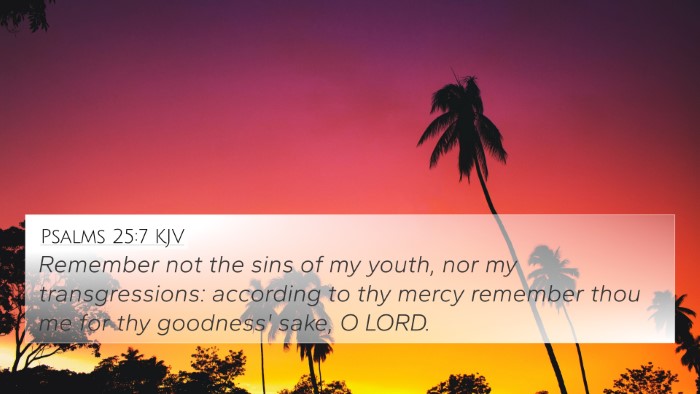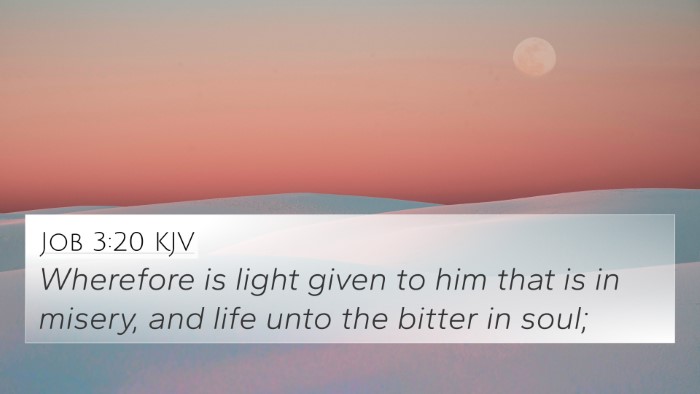Old Testament
Genesis Exodus Leviticus Numbers Deuteronomy Joshua Judges Ruth 1 Samuel 2 Samuel 1 Kings 2 Kings 1 Chronicles 2 Chronicles Ezra Nehemiah Esther Job Psalms Proverbs Ecclesiastes Song of Solomon Isaiah Jeremiah Lamentations Ezekiel Daniel Hosea Joel Amos Obadiah Jonah Micah Nahum Habakkuk Zephaniah Haggai Zechariah MalachiJob 13:26 Similar Verses
Job 13:26 Cross References
For thou writest bitter things against me, and makest me to possess the iniquities of my youth.
Uncover the Rich Themes and Topics of This Bible Verse
Listed below are the Bible themes associated with Job 13:26. We invite you to explore each theme to gain deeper insights into the Scriptures.
Job 13:26 Cross Reference Verses
This section features a detailed cross-reference designed to enrich your understanding of the Scriptures. Below, you will find carefully selected verses that echo the themes and teachings related to Job 13:26 KJV. Click on any image to explore detailed analyses of related Bible verses and uncover deeper theological insights.

Psalms 25:7 (KJV) »
Remember not the sins of my youth, nor my transgressions: according to thy mercy remember thou me for thy goodness' sake, O LORD.

Ruth 1:20 (KJV) »
And she said unto them, Call me not Naomi, call me Mara: for the Almighty hath dealt very bitterly with me.

Job 3:20 (KJV) »
Wherefore is light given to him that is in misery, and life unto the bitter in soul;

Job 20:11 (KJV) »
His bones are full of the sin of his youth, which shall lie down with him in the dust.

Jeremiah 31:19 (KJV) »
Surely after that I was turned, I repented; and after that I was instructed, I smote upon my thigh: I was ashamed, yea, even confounded, because I did bear the reproach of my youth.

John 5:14 (KJV) »
Afterward Jesus findeth him in the temple, and said unto him, Behold, thou art made whole: sin no more, lest a worse thing come unto thee.
Job 13:26 Verse Analysis and Similar Verses
Understanding Job 13:26
Job 13:26 states: "For You write bitter things against me, And make me inherit the iniquities of my youth."
This verse encapsulates Job's expression of his deep anguish and presents key themes about suffering, divine justice, and human accountability. Let's explore the interpretations of this verse based on insights from public domain commentaries by Matthew Henry, Albert Barnes, and Adam Clarke.
Verse Context
In the context of Job, this verse arises from Job's dialogue with his friends during his time of intense suffering. It represents a candid acknowledgment of personal guilt and the perception of God's role in his suffering.
Commentary Insights
-
Matthew Henry:
Henry discusses how Job, despite his suffering, does not hide from the notion of guilt. He recognizes that God may write against him, but he remains steadfast in his belief that he has not committed the sins his friends attribute to him. Job's bitterness stems from the perceived injustice he faces, provoking theological reflections on the nature of affliction and divine will.
-
Albert Barnes:
Barnes interprets this verse as Job's complaint against God for the harsh treatment he feels he receives. He suggests that Job's statement reflects his fear of being judged for the sins of his youth, emphasizing the weight of inherited sin and the struggles with past mistakes. It raises questions regarding God's justice and the balance between divine punishment and human fallibility.
-
Adam Clarke:
Clarke elaborates on the phrase "bitter things," connecting it to Job's overall experience of despair. He points out that Job acknowledges his youth's iniquities while also questioning why he bears the consequences if those sins are forgiven. This exploration reveals an inner conflict between personal repentance and the external suffering imposed by God.
Thematic Connections
The verse raises several interrelated biblical themes around suffering, sin, divine judgment, and the human condition. Below are some relevant Bible verse cross-references that echo these themes:
- Psalms 25:7: "Do not remember the sins of my youth, nor my transgressions; According to Your mercy remember me, For Your goodness' sake, O Lord."
- Isaiah 43:25: "I, even I, am He who blots out your transgressions for My own sake; And I will not remember your sins."
- Romans 3:23: "For all have sinned and fall short of the glory of God."
- 2 Corinthians 5:10: "For we must all appear before the judgment seat of Christ, that each one may receive the things done in the body, according to what he has done, whether good or bad."
- James 1:12: "Blessed is the man who endures temptation; for when he has been approved, he will receive the crown of life which the Lord has promised to those who love Him."
- Galatians 6:7: "Do not be deceived, God is not mocked; for whatever a man sows, that he will also reap."
- Hebrews 12:6: "For whom the Lord loves He chastens, And scourges every son whom He receives."
- Micah 7:18: "Who is a God like You, Pardoning iniquity And passing over the transgression of the remnant of His heritage?"
- Proverbs 28:13: "He who covers his sins will not prosper, But whoever confesses and forsakes them will have mercy."
- Ephesians 2:1-5: "And you He made alive, who were dead in trespasses and sins... but God, who is rich in mercy, because of His great love with which He loved us, even when we were dead in trespasses, made us alive together with Christ."
Cross-Referencing Biblical Texts
For those seeking to understand connections between Bible verses, this verse becomes a pivotal point for cross-referencing theological concepts about sin and redemption. Utilizing tools for Bible cross-referencing, such as a Bible concordance or a cross-reference Bible study guide, one can explore related themes. By examining scriptures that articulate God's mercy amidst human sinfulness, one can gain deeper insights into Job's plight and the broader biblical narrative surrounding suffering and hope.
Conclusion
Job 13:26 serves as a profound reflection on the human experience of suffering intertwined with the recognition of sin. The interpretations of this verse illustrate not only Job's personal struggle but also resonate with timeless themes in Scripture that explore the nature of God, the reality of human flaws, and the hope of divine compassion. By engaging in a comparative Bible verse analysis, readers can enrich their understanding of how various biblical texts interact and elaborate on the theological questions central to the faith journey.





